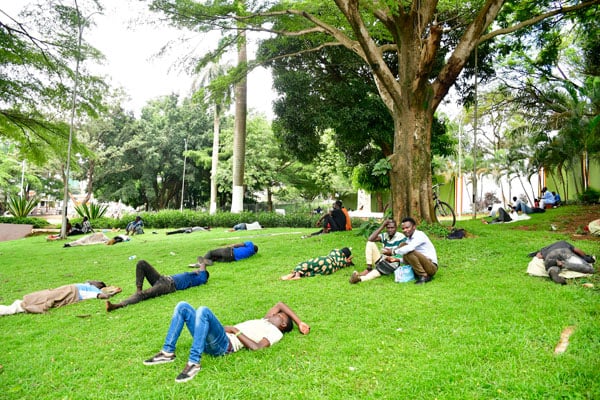Consider minimum wage for Ugandan workers

Idlers lounging at the Independence Monument at Speke Road in Kampala on November 30. According to the 2021 National Labour force report, 49 per cent of the working age population were outside the labour force. PHOTO/STEPHEN OTAGE
What you need to know:
- The issue: Minimum wage.
- Our view: We need a uniform pay for workers in the same categories that is commensurate with their qualifications and amount of time they put in.
- Otherwise as it stands, all efforts government has put in show that people are working, but are earning below the bare minimum..
News this week that about 20 million people engaged in gainful employment are earning a monthly payment of about Shs200,000 caused debate, with some people even questioning the Uganda Bureau of Statistics (Ubos) figures.
According to this newspaper, labour issue experts, sector analysts and government policy and economic managers described the terribly low wages as “peanut and unfortunate”.
This is just one strand in the National Labour Force Survey. The same study says at least 60 percent of Uganda’s 23 million people in the working age population search for jobs through their friends and relatives. Also, the same study reveals that at least 41 percent of the youth – which represents 9.3 million aged between 18 and 30 years – are not engaged in any productive activity.
Government should be credited for putting up a number of measures to try and bring down the high unemployment rate that has seen an exodus of young Ugandans try to seek employment in the Middle East.
We have in the past seen initiatives such as the Youth Livelihood Programme (YLP), and the Presidential Initiative on Skilling the Youth, to reforming the curriculum to ensure Ugandans learn practical skills that can help them make a living.
However, reports that more than half of Ugandans who we considered employed are earning a paltry Shs200,000 a month defeats the purpose of being employed. One wonders how such people survive if they are to live on Shs6,600 a day, accommodation, meals and transport inclusive.
Stakeholders have for a long time made a case for minimum wage, albeit with reluctance from the Executive. President Museveni has previously said a minimum wage would have negative implications on investment and the economy.
While declining to sign the Minimum Wage Bill, 2015, the President said in 2019 that issues the Bill intends to cure are already addressed in the Minimum Wages Advisory Boards and Wages Council Act.
But in the face of rising costs of commodities like we witnessed this year, it is clear that we need mechanisms for the determination of a minimum wage that is fair to both the employer and employees.
We need a uniform pay for workers in the same categories that is commensurate with their qualifications and amount of time they put in.
Otherwise as it stands, all efforts government has put in show that people are working, but are earning below the bare minimum.




